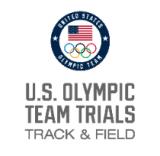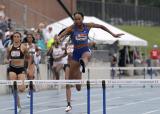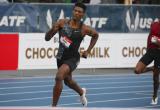Folders |
Dalilah Muhammad Dazzles in Des Moines With 400-Meter Hurdles World Record at Toyota USATF Outdoor ChampionshipsPublished by
Muhammad eclipses 2003 global mark of 52.34 seconds held by Pechonkina by running 52.20, prevailing against McLaughlin and Spencer to capture fourth U.S. national title By Erik Boal, DyeStat Editor DES MOINES – Midway through a lengthy post-race interview with several assembled media in the mixed zone at Drake Stadium, Dalilah Muhammad was asked if she felt overlooked or underrated entering the women’s 400-meter hurdles final Sunday at the Toyota USATF Outdoor Championships. RESULTS | PHOTOS | INTERVIEWS Considering Muhammad was the 2016 Olympic gold medalist and already a three-time national champion, in addition to boasting the fastest performance of any of the athletes in the field, the line of questioning might have seemed a little strange. But just as quick as her turnover clearing the hurdles, Muhammad responded, “You know, I do a little bit. I think people always root for the underdog, I guess, in the sport and that’s just kind of natural. I’m saying that because I felt like the underdog in the race.” Her reasoning was justified, with all the attention in the event prior to the meet focused on 19-year-old Sydney McLaughlin – also an Olympian with Muhammad in Rio de Janeiro – who prevailed in their June 13 showdown at the Bislett Games in Oslo, Norway. “It’s definitely kind of kept me humble this year and it’s definitely motivated me even more,” Muhammad added. “In hindsight, it has been an asset for me this year, keeping that motivation and knowing it’s going to be a difficult race and that I’m going to have to work really hard for it.” With rain falling before the race similar to the Olympic final in Rio, Muhammad stormed over the 10 barriers to electrify the crowd by breaking the 2003 world record of 52.34 seconds set by Yuliya Pechonkina of Russia, clocking 52.20 to capture her fourth national championship in seven years. “I’m still in shock. My coach (Lawrence Johnson) said there’s no way you can’t do it. He told me, ‘You just gotta execute off that last 40,’ and his words to drop your arms kind of hit me that last 40 and I was just trying to hold on,” said Muhammad, who elevated from the No. 6 all-time performer – fourth among Americans – to the top spot globally by lowering her previous personal-best 52.64 from the 2017 U.S. nationals. “I was aiming for it the whole weekend. This year, the world record has been on my mind.” McLaughlin, who closed a significant gap in the first half of the race to surge past Muhammad over the final hurdle and prevail by a 54.16 to 54.35 margin in Norway, took second in a season-best 52.88. Ashley Spencer, the 2016 Olympic bronze medalist, placed third by equaling her personal-best 53.11. “It could be rain, sleet, snow, you already know there’s going to be a show. I’m not surprised at all,” said Spencer, who won her first NCAA Division 1 400-meter title competing for Illinois at Drake Stadium in 2012 and qualified for her first IAAF World Championships by placing third in the 400 at U.S. nationals at the same venue in 2013. “I’m used to it. Being a U.S. female hurdler is the hardest thing to do. The top four in the world is the top four in the United States and you just have to show up and show out when it’s your time and hope that everything works in your favor.” Just like Muhammad did two years ago at the national finals in Sacramento, when she prevailed in the deepest 400 hurdles race in history, she again rose to the occasion against her American peers by not only recovering from a fall at practice and mild concussion two weeks ago, but learning from the final stretch of the Bislett Games showdown with McLaughlin to execute the necessary race plan Sunday. “It benefited me tremendously, honestly. When the field is so good, you can’t have a bad race. If anyone of us has a bad day, we’re not going to win. That’s the type of field the U.S. has,” Muhammad said. “I was trying something different (in Oslo). When you’re trying to break a world record and you’re trying to run fast times, you’ve got to take risks, and in that race, I took a risk. I wanted to push the back stretch and see what I could do coming home, and it wasn’t there. But I learned from it and it set me up for this race to know how hard I could push it on the back stretch.” McLaughlin, who was quick to offer a congratulatory embrace to Muhammad following the race, ran the second-fastest time of her career, trailing only the 52.75 collegiate record she produced competing for Kentucky during last year’s Southeastern Conference Championships. “I could feel the pace being pushed and I was just happy to be part of a world-record race. It was awesome,” McLaughlin said. “I think I was more in shock, maybe more than she was. I was just so happy for her. Just being able to experience something like that was great. “I think she learned from Oslo and I learned as well, with her finish and my start. I think we balance each other out and push each other to run times like this, and I think once I get more experience, hopefully I’ll be able to run at that level.” Muhammad, who was edged by fellow American Kori Carter by a 53.07 to 53.50 margin in the 400 hurdles final at the 2017 World Championships in London, was well aware of the closing speed of McLaughlin and Spencer, who both boast faster 400-meter personal bests. But her workouts since running a lifetime-best 50.60 in the open 400 at a meet June 16 in Chorzow, Poland gave Muhammad the feedback she needed in order to prepare to fend off all challengers in another memorable U.S. final. “We’ve been doing workouts in practice through eight hurdles and nine hurdles, and I’ve been consistently at record pace or under it,” Muhammad said. “Sydney has always had that amazing finish and that’s always in the back of my mind. Ashley and Sydney both have a great finish,” Muhammad said. “It’s always on my mind, but I was just looking to the finish line and I knew if I kept my form, I’d cross first.” Muhammad not only took down Pechonkina’s mark, but became only the second American female athlete to hold the 400 hurdles world record, joining Kim Batten, who ran 52.61 at the 1995 World Championships in Sweden. And she knows there is still room for improvement in preparation for the World Championships in October in Doha, Qatar. “I don’t want to say I could’ve done better because that was a world record, but it wasn’t a perfect race in terms of what I was hoping to do step wise and with my step pattern,” Muhammad said. “I switched at hurdle eight and I was hoping to switch at hurdle 10, so it was not the plan I wanted to go with, but sometimes that happens when you’re trying to turn over, and I had to put my foot down and take the hurdle with my opposite leg. I just had to refocus and keep that same turnover knowing I was going to be running with an extra step. It’s just one of those things that you’re just hoping for the best. I just trusted in what we had been working on at this point.” More news |










